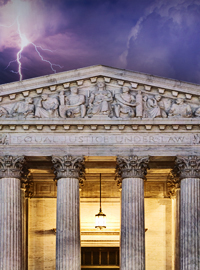| Humiliating New Legal Defeat for Obama Administration, but Rule of Law Remains in the Balance |
 |
|
By Timothy H. Lee
Thursday, July 24 2014 |
You don't need a fancy legal degree to understand that Congress intended for every eligible American to have access to tax credits that would lower their healthcare costs, regardless of whether it was state officials or federal officials who were running the marketplace." -White House spokesman Josh Earnest "It is not our job to protect the people from the consequences of their political choices." -Chief Justice John Roberts The Obama Administration suffered another humiliating judicial defeat this week, as the Court of Appeals for the D.C. Circuit, often labeled the nation's second-highest court, invalidated an administration attempt to rewrite the settled text of the ObamaCare statute. Hours later, the Fourth Circuit Court of Appeals reached the opposite conclusion, meaning that the Supreme Court will almost certainly have to address the matter. The immediate issue before both courts was whether Obama's Internal Revenue Service (IRS) justifiably extended subsidies to insurance exchanges operated by the federal government even though the statute's text only allowed them for "an Exchange established by the State." In passing ObamaCare by the slimmest of margins in 2010, Congress sought a way to pressure states to create the insurance exchanges through which the law would function. Since Congress cannot affirmatively require states to implement federal laws under the Constitution, it attempted to persuade states by promising subsidies for insurance purchases through an "Exchange established by the State." That was no accidental omission, nor was it some sort of typographical error. Rather, the statute refrained from providing federal subsidies because its proponents arrogantly assumed that states would fall in line. But then a funny thing happened. Namely, ObamaCare proved decidedly unpopular, and some 36 states declined to officially partner in its disastrous remaking of the nation's healthcare sector. Nearly two-thirds of the American population lives in those 36 states, as do most of those who have applied for ObamaCare to date. Accordingly, facing potential disaster, the IRS in May 2012 pursued a familiar Obama Administration course and simply ignored the plain text of the law. Instead, it arbitrarily decided that subsidies and penalties would extend to exchanges operated by the federal government in the 36 states that opted out of ObamaCare. "By making credits more widely available," noted by the D.C. Circuit, "the IRS rule gives the individual and employer mandates - key provisions of the ACA - broader effect than they would have if credits were limited to state-established Exchanges." The question now becomes whether this arbitrary disregard of statutory text will be sustained by the Supreme Court. Per his remark quoted above, White House spokesman Josh Earnest may be correct that one need not possess a "fancy legal degree" to speculate about Congressional intent. But just as surely, one need not possess such a degree to understand the plain meaning of the word "State." Nancy Pelosi herself claimed that we needed to pass ObamaCare in order to find out what's in it, but displeasure upon such discoveries does not excuse disregard of our constitutional system. Accordingly, there is more at stake in the ultimate resolution of this matter than ObamaCare subsidies, or even the fiscal sustainability of ObamaCare itself. Rather, the extent to which the United States remains a nation of laws rather than of men is partly at stake. The concept of rule of law demands that citizens and authorities remain able to chart their behavior and decisions according to applicable rules. That, in turn, requires an ability to rely upon reasonable interpretations of those rules and their plain meaning to the greatest degree possible, as opposed to speculating how politicized bureaucrats will choose to enforce them. Some degree of ambiguity is inevitable in law as in human life generally, of course. When authorities become able to ignore or rewrite reasonably clear laws, however, uncertainty and arbitrary enforcement render citizens' ability to steer their behavior based upon how the laws will be enforced against them crumbles. In those circumstances, what becomes important is who is enforcing the laws, not the laws themselves. We become more a nation of men, not laws. As stated by the D.C. Circuit: "Within constitutional limits, Congress is supreme in matters of policy, and the consequences of that supremacy is that our duty when interpreting a statute is to ascertain the meaning of the words of the statute duly enacted through the formal legislative process. This limited role serves democratic interests by ensuring that policy is made by elected, politically accountable representatives, not by appointed, life-tenured judges." Fortunately, the Supreme Court in its latest term held that the Obama Administration and its administrative arms like the Environmental Protection Agency (EPA) remain subject to constitutional and statutory text such as the provisions in question here. Hopefully, the Court and Justice Roberts continue to uphold the rule of law, rather than toss ObamaCare an undeserved lifesaver like it did in 2012. |
Related Articles : |
























